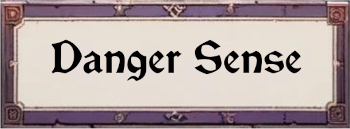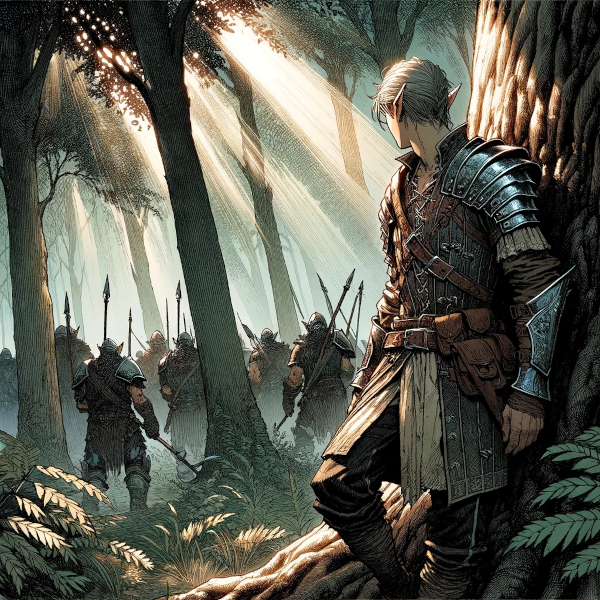


Thanks to their extensive experience traversing diverse terrains and their keen attention to detail, Vagabonds have honed a unique sixth sense. This intuitive ability, cultivated through adaptation to various environments and a lifetime of exploration, enables them to detect the subtle signs indicating imminent danger. Whether navigating bustling urban streets or remote wilderness, their finely tuned instincts serve as an early warning system, alerting them to potential threats before they materialize. This heightened awareness, borne from a combination of practical know-how and adaptability, grants Vagabonds a distinct advantage in safeguarding themselves against hazards that may go unnoticed by others.
Specifically, this ability may be used in two different ways both being passive and triggered automatically.
The first one, known as Trap Sense, aids Vagabonds in detecting traps within their environment, allowing them to perceive potential dangers that might elude other adventurers. By noticing subtle cues Vagabonds can sense the presence of traps created by intelligent beings as well as natural hazards like unstable bridges or falling rocks.
The second one, known as Encounter Awareness, allows a Vagabond during travel or similar situations, to be alerted of impending encounters with wandering creatures or predetermined events. Practically, when faced with unexpected creatures during travel, the Vagabond can undergo an automatic test offering a chance to anticipate and briefly prepare for the impending encounter.
To acquire the ability to use both these methods, a Vagabond must spend at least 25 points into this ability. In this calculation are taken into account only the points allocated to this ability not the additional points that result from modifiers (e.g., their race, class, and Observation score). Importantly, this requirement may be met at later stages of character development rather than during initial creation.
Both methods of using this ability are modified by the score that the Vagabond has in Observation as follows:
| Observation Score | Modifier | Observation Score | Modifier |
| 30 | -18% | 65 | +3% |
| 35 | -15% | 70 | +6% |
| 40 | -12% | 75 | +9% |
| 45 | -9% | 80 | +12% |
| 50 | -6% | 85 | +15% |
| 55 | -3% | 90 | +18% |
| 60 | None | 95+ | +21% |

This ability can also be used in a first way helping Vagabonds to sense the presence of traps in the environment they are exploring. They may perceive the presence of these dangers by noticing details that escape other adventurers, such as the absence of certain animals or the presence of insects, stains, or other marks on the walls or floors, and so on. In such situations, the Vagabond has to success in a test in this ability.
This ability is passive and automatically activated where they approach a distance equal to 1d4+1 per three meters from a trap. If the test, which is carried out secretly, succeeds, the Vagabond will realize he or she is near a potential trap and can then act accordingly. It should be noted that upon passing this passive check, the Vagabond does not become aware of the type, specific position, or effects of the trap itself, having to use other methods to interact with the trap. It must also be observed that since this is an automatic and secret check, it cannot be modified by the Vagabond, for example, Fate Points or Divine Points cannot be used on it.
This passive ability will activate automatically when the Vagabond approaches traps of different kinds. These traps could be entirely natural, stemming from natural phenomena like a precarious bridge or the danger of falling rocks, rather than being created by intelligent creatures. Furthermore, this ability will also be activated by the presence of near traps created by intelligent beings, including basic traps like a covered pit, more intricate mechanical traps, or those utilizing magic for their effects and/or activation.
Moreover, the following modifiers apply to this test:
- A penalty of -10% for each difficulty rank of the trap or natural hazard beyond the first (note that traps can be divided into seven different danger ranks).
- A bonus of +10% if the trap is of a rudimentary type, no modifier if the trap is merely the result of a natural phenomena, an additional penalty of 2% per danger rank of the trap if it is mechanical, and an additional penalty of 5% per danger rank of the trap if it is magical or partially magical (i.e., uses magic for its activation and effects).
- A penalty equal to the vision penalties applicable to the Vagabond (for this purpose, the penalty imposed at the closest position, i.e., 6 meters away, should be calculated, not the actual distance from the trap). If the Vagabond is using "infravision" instead of normal light the applicable penalty will be -15%.
- Where the vagabond may incur potential penalties to their attack rolls to be applied in specific situations such as mental incapacity or fatigue, there is a penalty of minus 5% to the test in this ability for each applicable penalty point.
Encounter Awareness

The second method of using this ability is passive and activates automatically in situations such as travel, where the Vagabond is about to encounter wandering creatures or predetermined encounters (not in a scenario of tactical exploration). In order to utilize this ability, the Vagabond must be alert and capable of acting, as it cannot be employed while asleep or in stasis. It's important to note that this ability does not prevent potential surprises, in accordance with the rules governing encounters with creatures or general sighting rules. Thus, the vagabond must remain vigilant to avoid being caught off guard by the approaching encounter. In practical terms, when during a travel or similar situation, the Vagabond is about to encounter unexpected creatures and is not suprised by them, he or she will have the opportunity to pass an automatic a test in this ability noise perception, with the application of a series specific modifiers. This test be modified by the Vagabond, for example, using Fate Points or Divine Points.
Apart from the modifiers implied by the score that the Vagabond possesses in Observation, this method of using this ability is modified by the score that the Vagabond has in Sound Perception, which is added to the score that the points he has spent in this ability.
Modifiers for the activities carried out by the vagabond at the time of the encounter:
Standing still actively on guard
(link) and not surprised by the encounter: +10%
Engaged in cautious marching: +5%
Engaged in regular marching: No Modifier
Engaged in hastened marching: -7%
Engaged in any activity other than marching and guarding that keeps the Vagabond
distracted: -25%
Modifiers for the noises present in
the encounter area:
Wind Situation
No Wind: No Modifier
Light Breeze: -10%
Strong Wind: -33%
Storm or Tornado: Not Possible
Precipitations
None/Snowfall: No Modifier
Light Rain: -15%
Rain: -40%
Heavy Rain/Hailstorm: Not Possible
Background Sounds
Due to background sounds, the Dungeon Master may impose a penalty from -5% to
-20% or declare the action "Not Possible" (consider the roar of a waterfall).
Party noises are not considered for this purpose.
Geographical Zone (represents a synthesis
of common characteristics of the area including background noises and those
generated by the group):
Plain/Rolling Plain: No Modifier
Gentle Hill: -3%
Rugged Hill: -6%
Mountain: -9%
Sandy Desert: +3%
Swamp: -12%
Cave: +6%
Rocky Terrain: -5%
Light Forest: -6%
Heavy Forest: -12%
Snowy Area: +5%
Modifiers for the type of creatures
encountered:
Number of Creatures
For each creature that is not "inaudible": +5%
Creature Size (per creature)
For each Tiny creature: -4%
For each Small creature: -2%
For each Medium creature: No Modifier
For each Large creature: +3%
For each Huge creature: +8%
For each Gargantuan creature: +20%
Creature Characteristics
Constant buzzing in flight (insects): No Modifier
Common flying: -15%
Flying with "Silent Flight" ability: Inaudible
Flying with silent or levitating propulsion: Inaudible
Rolling Creature: +5%
Crawling Creature: -10%
Creature with "Lower Diminished Sighting" ability: -3%
Creature with "Diminished Sighting" ability: -6%
Creature with "Superior Diminished Sighting" ability: -9%
Creature with "Lower Prey Surprise" ability: -5%
Creature with "Moderate Prey Surprise" ability: -10%
Creature with "Superior Prey Surprise" ability: -15%
Incorporeal Beings (if they do not produce particular sounds): Inaudible
Modifiers for creatures traveling with the
vagabond (not including the vagabond) within 36 meters:
For each creature besides the vagabond (not in stasis, sleeping, or silent,
including mounts): -5%
Apply the modifiers provided above for encountered creatures in an "inverted"
manner for each of these creatures, considering that bonuses can at most cancel
out the penalty caused by the presence of the creature.
Outcome of the test
If the vagabond succeeds in the test, he or she will become aware of the
direction(s) from which the creatures are approaching, the approximate distance
(i.e., the distance category as indicated in the wandering encounter table), and
the approximate number of creatures (audible) according to the following scheme:
a single creature "single entity"; 2 to 4 creatures "a few creatures"; 5 to 9
creatures "a significant number"; 10 creatures or more "several creatures". The
Vagabond can also determine the approximate size of the creatures if the sound
relates to small ("tiny" or "small"), medium ("medium" or "large"), or large
("huge" or "gargantuan") creatures. Finally, if the vagabond possesses Universal
Competence "Lore" related to the approaching creature, they can also make a test
in that competence, applying a penalty of -10%. If the test succeeds, the
Vagabond will become also aware of the general category of the creature without
being able to identify its specific type.
Furthermore, just before the "placement" of the encountered creatures on the map (and therefore determining their exact position and type), the vagabond can attempt a test on their combined Agility and Sagacity score (rounded down and applying all relevant penalties). If the test succeeds, they will be entitled to one round that they can use freely. If the test fails, they cannot perform complex actions, spellcasting, or full movement actions during the additional round granted to them. They can only perform non-actions, free actions to be taken at the beginning of the round, and half-movement actions. Note that, in both cases, since the Vagabond may perceive the approach of the creatures immediately before their arrival, he or she only have a brief window to act swiftly, unable to warn, involve, or interact with others allies or companions in his or her actions. ert the